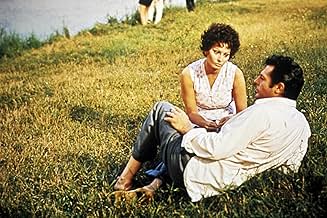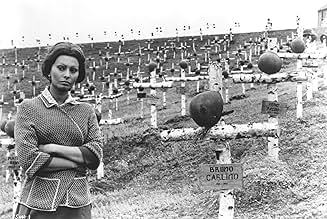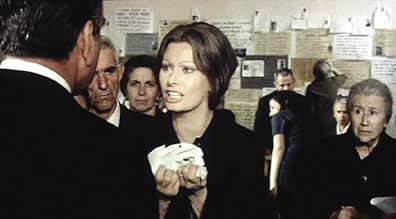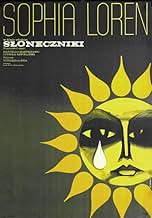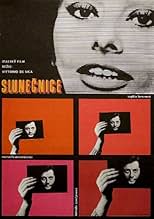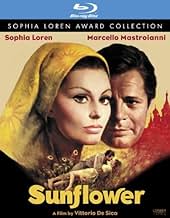AVALIAÇÃO DA IMDb
7,3/10
4,9 mil
SUA AVALIAÇÃO
Adicionar um enredo no seu idiomaAn Italian woman conducts a desperate search for her husband, a soldier considered missing in action in Russia during WWII.An Italian woman conducts a desperate search for her husband, a soldier considered missing in action in Russia during WWII.An Italian woman conducts a desperate search for her husband, a soldier considered missing in action in Russia during WWII.
- Direção
- Roteiristas
- Artistas
- Indicado a 1 Oscar
- 1 vitória e 2 indicações no total
Lyudmila Saveleva
- Mascia
- (as Ljudmila Saveljeva)
Nadya Serednichenko
- Contadina russa
- (as Nadja Cerednicenko)
Gunars Cilinskis
- Funzionario russo
- (as Gunnar Zilinskij)
Carlo Ponti Jr.
- Giovanna's Baby
- (não creditado)
Mariya Sapozhnikova
- Passerby
- (não creditado)
- Direção
- Roteiristas
- Elenco e equipe completos
- Produção, bilheteria e muito mais no IMDbPro
Avaliações em destaque
meeting between two great actors and an impressive director. images from Italy and picture of Russia in the air of Cold War.a basic story about a couple, a war and a choice. a travel and the form of truth. beautiful music and force of unspoken words. that is all. or only gentle performance of Ludmila Savelieva. a great film. not for cast or dramatic slices, for the force of emotions or for the sunflower as vegetable testimonies about a tragedy. but only for its virtue to be a seed. a seed of questions and answers. an exercise of empathy. a sad love story in which love is more than feeling. a poem but just a very special poem. mixture of pure joy, shadows of war, a miracle and a search, it is homage to a sacrifice generation and reflection of deep need of sense in a chaotic world. nothing pink, nothing cold. only picture of a man, a young Russian woman who speaks Italian, a charming Sophia Loren and same Mastroianni. but the essence is possession of public.
I went to a san francisco theatre to see this film along with my mother when I was a teenager in the 60's. It was in english and I loved it so much I saw it twice. I never forgot it, and although it was never shown again, I was told by someone a few years ago, that it was featured on one of the cable channels, and unfortunately I must have missed it. I don't think its ever been shown since. In my humble opinion, this classic movie depicting love, war, passion, separation, hope, and tears should be rated right up there along with Dr. Zhivago, Casablanca, In Love and War, and many other great films of all time. It's a pity that this movie "Sunflower" is nowhere to be found on video or better yet DVD in the english version in the U.S. I did purchase it on video in Italian, and even though I am fluent in Italian and can understand it, others in my household cannot. Can somebody PLEASE see that it gets some recognition, and becomes a familiar movie and available here in the U.S.A.?
As another reviewer pointed out this bit of cold war propaganda (pro Soviet) was absurdly impossible. An axis soldier would have been shot period or arrested as a spy and killed slowly in a prison camp.
So you have to dismiss the story as absurd as it stands and place it in Iran or Finland or some place where it could have happened. Or just suspend your disbelief.
Once you do that you can enjoy this bit of really well done maudlin romance. Loren had to be at the height of her classy beauty in this film (before she was aged for the story).
I loved the part where she spots an Italian man---the only handsome well dressed stylish man in any of the Russian scenes. Of course Loren herself is like a super nova star compared to the kerchiefed thick legged Russian women. Italian audiences must have loved this film.
I give it a 7 as it is very enjoyable once you deal with the absurd story and the maudlin nature of the movie. As another reviewer states what is so wrong with first class maudlin??
So you have to dismiss the story as absurd as it stands and place it in Iran or Finland or some place where it could have happened. Or just suspend your disbelief.
Once you do that you can enjoy this bit of really well done maudlin romance. Loren had to be at the height of her classy beauty in this film (before she was aged for the story).
I loved the part where she spots an Italian man---the only handsome well dressed stylish man in any of the Russian scenes. Of course Loren herself is like a super nova star compared to the kerchiefed thick legged Russian women. Italian audiences must have loved this film.
I give it a 7 as it is very enjoyable once you deal with the absurd story and the maudlin nature of the movie. As another reviewer states what is so wrong with first class maudlin??
Vittorio de Sica achieved a remarkable feat in this eye-catching 1970 production, bringing together Americans and Soviets, in the midst of the Cold War, in the co-production of a Franco-Italian film.
From the Americans he got a memorable soundtrack, written and directed by Henry Mancini and nominated for an Oscar. From the Soviets he received the footage from Mosfilm, directed by Andrey Konchalovskiy, as well as the actress Ludmila Saveleva.
The script by Tonino Guerra and Cesare Zavattini has everything it needs to work, but the film gets lost somewhere in between so many attributes.
The story is basic and excessively melodramatic. The soundtrack is beautiful but quickly becomes cloying. The footage of the sunflower fields and the cemeteries of Russian combatants is powerful and eloquent, but inconsequential. This is, after all, a story of the living, not the dead. Only the final notes of the fatalism of war, which determines people's fates, far beyond their individual will, remain to give the film any meaning.
But it is not enough. A final result clearly less than the sum of its parts.
From the Americans he got a memorable soundtrack, written and directed by Henry Mancini and nominated for an Oscar. From the Soviets he received the footage from Mosfilm, directed by Andrey Konchalovskiy, as well as the actress Ludmila Saveleva.
The script by Tonino Guerra and Cesare Zavattini has everything it needs to work, but the film gets lost somewhere in between so many attributes.
The story is basic and excessively melodramatic. The soundtrack is beautiful but quickly becomes cloying. The footage of the sunflower fields and the cemeteries of Russian combatants is powerful and eloquent, but inconsequential. This is, after all, a story of the living, not the dead. Only the final notes of the fatalism of war, which determines people's fates, far beyond their individual will, remain to give the film any meaning.
But it is not enough. A final result clearly less than the sum of its parts.
In Naples, in World War II, the local Giovanna (Sophia Loren) has a torrid love affair with the soldier Antonio (Marcello Mastroianni), who is ready to embark to Africa. Giovanna proposes him to get married with her to get a leave of twelve days; then Antonio pretends that he is insane and he is sent to an asylum. However, the doctors discover the farce and they give the option to Antonio to go to the Russian front as volunteer instead of being sued. When Antonio is missing in action in Russia, Giovanna does not accept that he is dead. Years after the end of the war, Giovanna travels to Russia with a picture of Antonio to seek him out in the countryside. When she finds a lead in a village, her hope becomes disappointment with truth about his disappearance.
"I Girasoli" is one of the most famous romances of cinema and discloses a beautiful story of love, hope, truth and renounce. Vittorio De Sica explores the chemistry between Sophia Loren and Marcello Mastroianni to the best, supported by a magnificent cinematography and the wonderful soundtrack of Henry Mancini, which certainly is among the most beautiful ones of the cinema history. The screenplay uses much ellipsis, and my remarks are the lack of dates, leaving the viewer without any reference of how many years have passed; further, the dialogs in Russian that are not translated. My vote is eight.
Title (Brazil): "Os Girassóis da Rússia" ("The Russia's Sunflowers")
"I Girasoli" is one of the most famous romances of cinema and discloses a beautiful story of love, hope, truth and renounce. Vittorio De Sica explores the chemistry between Sophia Loren and Marcello Mastroianni to the best, supported by a magnificent cinematography and the wonderful soundtrack of Henry Mancini, which certainly is among the most beautiful ones of the cinema history. The screenplay uses much ellipsis, and my remarks are the lack of dates, leaving the viewer without any reference of how many years have passed; further, the dialogs in Russian that are not translated. My vote is eight.
Title (Brazil): "Os Girassóis da Rússia" ("The Russia's Sunflowers")
Você sabia?
- CuriosidadesThe child of Giovanna (Sophia Loren) in this film was actually Loren's from her partnership with producer Carlo Ponti.
- Erros de gravaçãoMascia tells Giovanna that when she found Antonio, he was hurt so badly that he had forgotten everything, including his own name. If that's true, then how did Mascia know his name was Antonio?
- ConexõesEdited into Marcello, uma Vida Doce (2006)
Principais escolhas
Faça login para avaliar e ver a lista de recomendações personalizadas
- How long is Sunflower?Fornecido pela Alexa
Detalhes
- Data de lançamento
- Países de origem
- Idiomas
- Também conhecido como
- Sunflower
- Locações de filme
- Empresas de produção
- Consulte mais créditos da empresa na IMDbPro
- Tempo de duração
- 1 h 47 min(107 min)
- Mixagem de som
- Proporção
- 1.85 : 1
Contribua para esta página
Sugerir uma alteração ou adicionar conteúdo ausente


